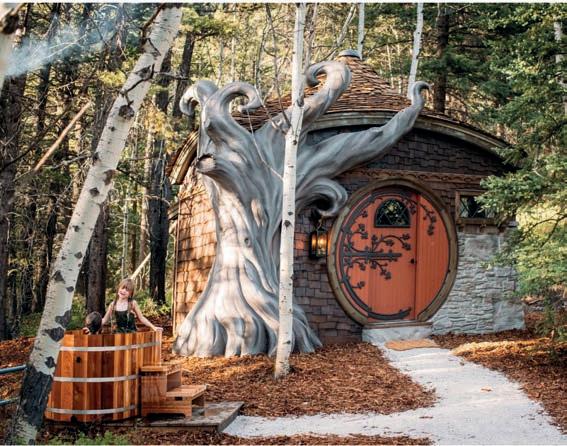
5 minute read
Concussion guide for parents and caregivers
By Parachute Canada
What is a concussion?
Advertisement
A concussion is a brain injury that cannot be seen on routine X-rays, CT scans, or MRIs. It affects the way a child may think and remember things, and can cause a variety of symptoms.
What are the signs and symptoms of a concussion?
Your child does not need to be knocked out (lose consciousness) to have had a concussion. Your child might experience one or more of the following: n Thinking problems: • Does not know time, date, place, details about a recent activity • General confusion • Cannot remember things that happened before and after the injury • Knocked out n Child’s complaints: • Headache • Dizziness • Feels dazed • Feels “dinged” or stunned; “having my bell rung” • Sees stars, flashing lights • Ringing in the ears • Sleepiness • Loss of vision • Sees double or blurry • Stomachache, stomach pain, nausea n Other problems: • Poor coordination or balance • Blank stare/glassy-eyed • Vomiting • Slurred speech • Slow to answer questions or follow directions • Easily distracted • Poor concentration • Strange or inappropriate emotions (i.e., laughing, crying, getting mad easily) • Not participating well
It is harder for infants, toddlers, and preschoolers to communicate how they are feeling. If you have a young child, you might notice any of the following: crying more than usual; unsteady walking; lack of interest in favorite toys; changes in nursing, eating or sleeping patterns; or loss of new skills, such as toilet training.
Get medical help immediately if your child has any “red flag” symptoms such as neck pain, repeated vomiting, growing confusion, seizures, and weakness or tingling in their arms or legs. These may be signs of a more serious injury.
What causes a concussion?
Any blow to the head, face or neck, or a blow to the body which causes a sudden jarring of the head may cause a concussion (e.g., a ball to the head, colliding with another person).
What should I do if I suspect my child has a concussion?
In all suspected cases of concussion, your child should stop the activity right away. Continuing increases their risk of more severe, longer-lasting concussion symptoms, as well as increases their risk of other injury.
The Concussion Recognition Tool 5 (CRT5) available widely online can be used by anyone to help recognize the signs and symptoms of a possible concussion.
Your child should not be left alone and should be seen by a doctor as soon as possible that day.
If your child loses consciousness, call an ambulance to take them to the hospital right away. Do not move your child or remove any equipment such as a helmet.
Your child should not return to play the same day.
SPLASH LIFT PLAY CREATE
Sign up today and join our vibrant, welcoming community!



How long before my child gets better?
The signs and symptoms of a concussion often last for one to four weeks but may last longer. In some cases, children may take many weeks or months to heal. If your child has had a concussion before, they may take longer to heal.
If your child’s symptoms are persistent (i.e., last longer than four weeks in youth under 18 years old), they should be referred to a healthcare professional who is an expert in the management of concussion.
How is concussion treated?
After an initial short period of rest (24 to 48 hours), light cognitive and physical activity can begin, as long as these don’t worsen symptoms. A medical doctor, preferably one with experience managing concussions, should be consulted before beginning step-wise Returnto-School and Return-to-Sport Strategies.
As your child is recovering from concussion, they should not do any activities that may make their symptoms worse. This might mean limiting activities such as riding their bike, play wrestling, reading, working on the computer or playing video games.
Recovering from concussion is a process that takes patience. If your child goes back to activities before they are ready, it is likely to make their symptoms worse, and their recovery might take longer. When should my child go to the doctor?
Anyone with a possible head injury should be seen by a doctor as soon as possible. If your child is diagnosed with a concussion, the doctor should schedule a follow-up visit within the next one to two weeks.
Take your child back to the doctor immediately if, after being told they have a concussion, they have worsening symptoms, such as: • Being more confused • Headache that is getting worse • Vomiting more than twice • Not waking up • Having any trouble walking • Having a seizure • Strange behavior


TRICO KIDS KLUB
This action packed program transitions children through circle time, play-based learning activities, snack, crafts, and active games! A wonderful opportunity to explore, be curious, and develop age-appropriate skills.
PRO TIP with 2 hours child-free, you can explore the facility - pool, fitness centre, gymnasium, or group exercise classes! When can my child return to school, sport and physical activity?
Visit parachute.ca/en/injury-topic/concussion for Return-to-School and Return-to-Sport Strategies to help guide your child’s re-entry to learning and physical activity. It is essential that this is approached step-by-step for their safety and proper healing.

Parachute is Canada’s national charity dedicated to injury prevention. We envision a Canada free of serious injuries, with Canadians living long lives to the fullest. Visit us at parachute.ca for guidelines and resources about injury prevention and treatment.











